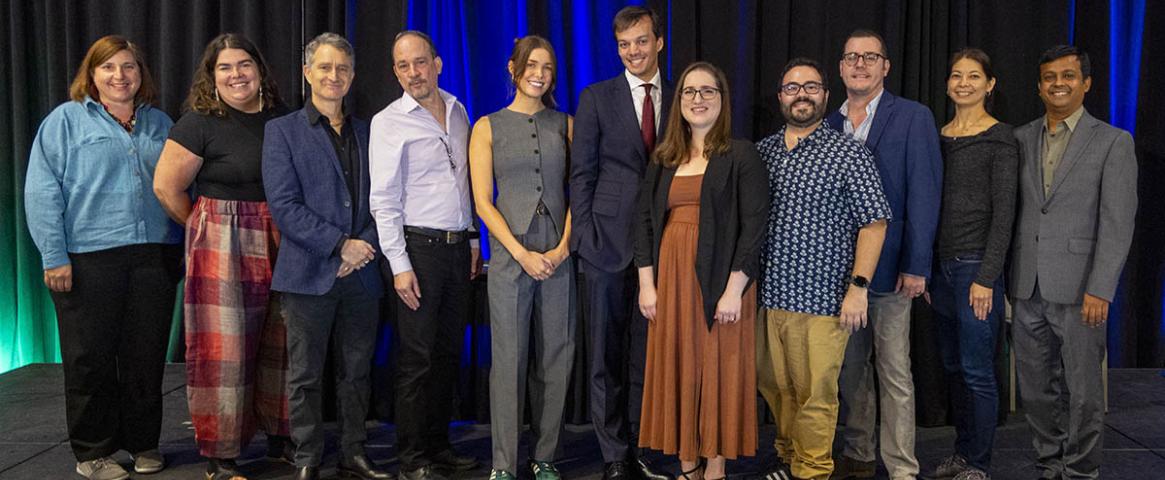Story by Nina Elkadi
Photography by Megan Medenhall
The convention center ballroom was abuzz with the clang of forks and knives as science writers congratulated their colleagues on awards presented by the National Association of Science Writers (NASW) and the Council for the Advancement of Science Writing (CASW) at the ScienceWriters2024 national conference in Raleigh, N.C.
CASW president Robin Lloyd began the #SciWriAwards ceremony by acknowledging the service of new CASW executive director Meaghan Parker and recently retired CASW executive director Rosalind Reid.
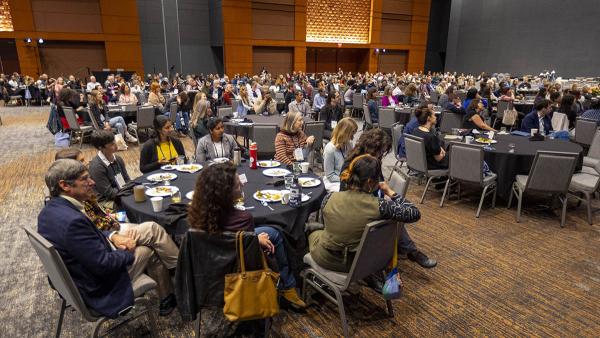
NASW and CASW board members take in the awards luncheon festivities at ScienceWriters2024. (Megan Mendenhall for CASW/NASW)
Newly-elected NASW president Sandeep Ravindran presented the NASW Science in Society Journalism Awards, which were established to provide recognition for investigative or interpretive reporting about the sciences and their impact on society. Ravindran lauded recipients across the books, science reporting, science feature, longform narratives, series, and commentary categories
Christopher Pollon, author of Pitfall: The Race to Mine the World’s Most Vulnerable Places, was awarded in the books category. The judges “noted that Pollon takes on this enormous topic of adopting reporting effort that shows us the many faces of modern mining around the world.”
The award for best science reporting was given to Science staff writer Rodrigo Pérez Ortega, for his piece, "Should beetles be named after Adolf Hitler?"
“Thank you to my friends and colleagues who inspired me to keep reporting on complex issues and producing stories that matter. Thank you to NASW for being such an inclusive and supportive community,” Pérez Ortega said. “Thank you to my mom, who’s listening in Mexico City. Muchas gracias por siempre creer en mi. Te amo mucho.”
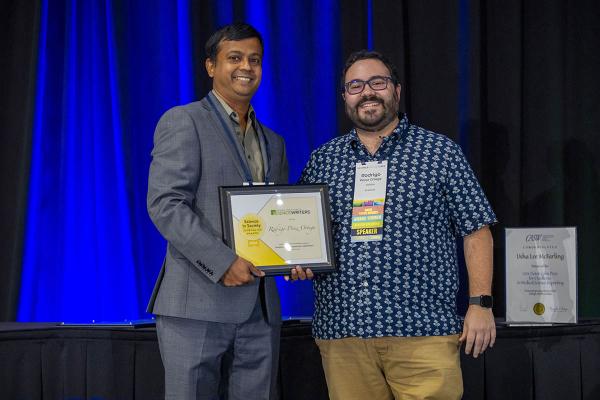
Rodrigo Pérez Ortega accepts his award from NASW board president Sandeep Ravindran. (Megan Mendenhall for CASW/NASW)
In the science feature category, W.J. Hennigan was awarded for "In the Lab Oppenheimer Built, the U.S. Is Building Nuclear Bomb Cores Again", published in TIME. Hennigan, now an opinion correspondent at The New York Times, thanked NASW for “validating this story.”
“My editors thought I was crazy and weren’t quite sure I’d pull off the story,” he said. “If you do take a look at it, I ask you to ponder the question, are we headed toward a brighter future or toward a darker past?
Vince Beiser was awarded in the longform narratives category for his piece in WIRED, "The Mining Industry’s Next Frontier Is Deep, Deep Under the Sea". Judges applauded the “clear and effective way in which Beiser brings leaders up to date on this crucial hidden issue by following one entrepreneur through his journey to harvest metals from the ocean floor.”
"Bleeding Out" by investigative reporter Lauren Caruba of The Dallas Morning News and Ari Sen, now an investigative data journalist with CBS News, co-published by The Dallas Morning News and the San Antonio Express-News, was awarded in the series category.
“I think it's really rare that you get to work on a story that truly involves matters of life and death,” Caruba said. “I talked to dozens and dozens of trauma surgeons and researchers and paramedics who told me that our reporting is going to actually help save people's lives. And I just can't think of anything more rewarding than that.”
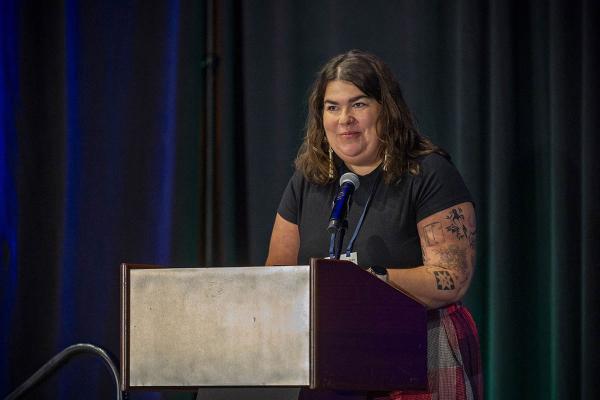
NASW honoree Elizabeth Endicott delivering an acceptance speech during the ScienceWriters2024 awards ceremony. (Megan Mendenhall for CASW/NASW)
Writer and artist Elizabeth Endicott won in the commentary category for her piece, "I Worked in Antarctica for Three Years. My Sexual Harasser Was Never Caught", published in Scientific American.
“It took me a decade to feel brave enough to tell my part of this story, and to be honest, it was really scary to call out a government agency,” Endicott said. “But the feedback I received after publication, including this award today, taught me that these stories still need to be told now more than ever.”
NASW President Ravindran then commended the two winners for the NASW Excellence in Institutional Writing Awards (EIWA), which recognize high caliber, publicly accessible science writing produced on behalf of an institution or other non-media organization.
"Going Deep: The Perils and Promise of Long Science" by the team of Christopher Pollon, Tyee Bridge, and Jonathan Kellogg, for the Pacific Association of the Canadian Integrated Ocean Observing System, was awarded in the EIWA long-form category. “The authors weave together different examples of long science and explain many scientific concepts in a way that a general audience can understand and as part of a compelling overall narrative,” the judges said.
In the EIWA short-form category, "Saving Sea Turtles, One Paddle at a Time" by Marilyn Perkins, writing for Thomas Jefferson University, was awarded.
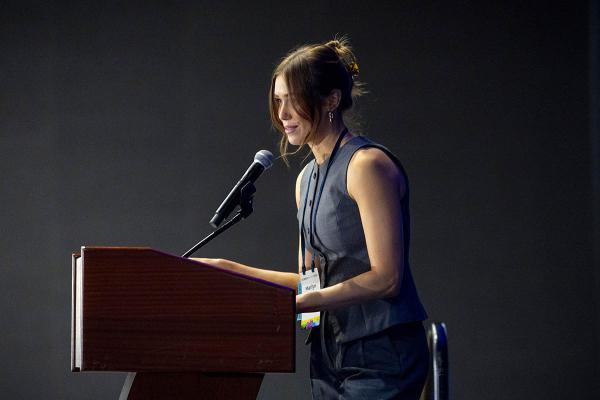
NASW honoree Marilyn Perkins delivering an acceptance speech during the ScienceWriters2024 awards ceremony. (Megan Mendenhall for CASW/NASW)
“The biggest thing that I learned from this piece is how effective it can be to just zoom in on one moment in the scientific process,” Perkins said. “Following the struggles and successes of a scientist for one day, or one week, and being in the field really tell us a different sort of story that I hope makes the scientific process more transparent and helps the reader empathize with everything that goes on in research.”
CASW presented their awards to bookend the ceremony with the Clark/Payne Award, given to Jason Mast this year; the Victor Cohn Prize, awarded to national science correspondent at STAT Usha Lee McFarling; and the Sharon Begley Award, given to Hannah Furfaro, mental health reporter for The Seattle Times.
“Congratulations to all the award winners,” CASW President Lloyd said. “We're so proud of you and excited to celebrate with you. We're very inspired by your accomplishments.”
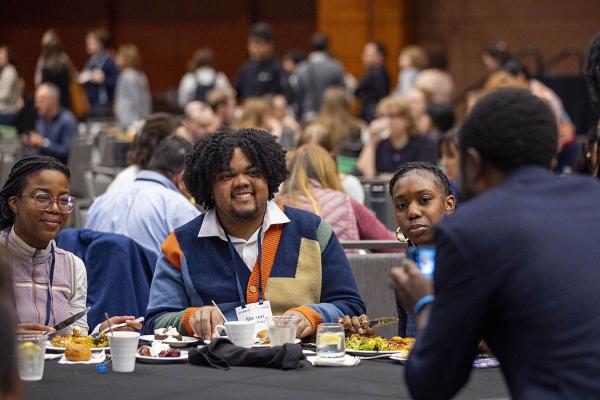
ScienceWriters2024 attendees enjoying the awards luncheon festivities. (Megan Mendenhall for CASW/NASW)
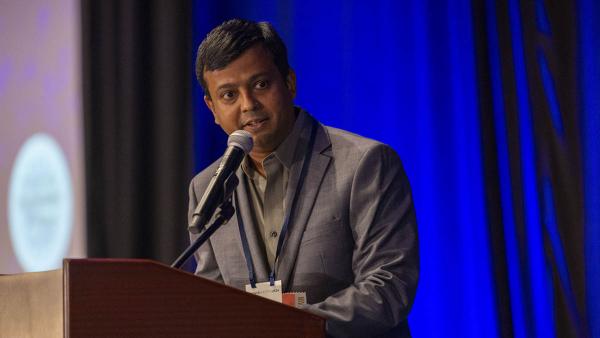
NASW board president Sandeep Ravindran emcees the ScienceWriters2024 awards luncheon. (Megan Mendenhall for CASW/NASW)
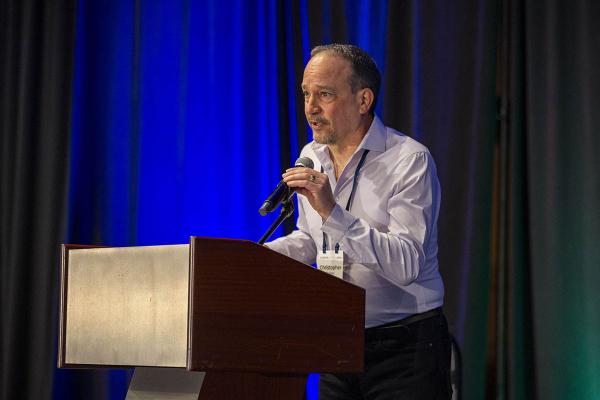
NASW honoree Christopher Pollon delivering an acceptance speech during the ScienceWriters2024 awards ceremony. (Megan Mendenhall for CASW/NASW)
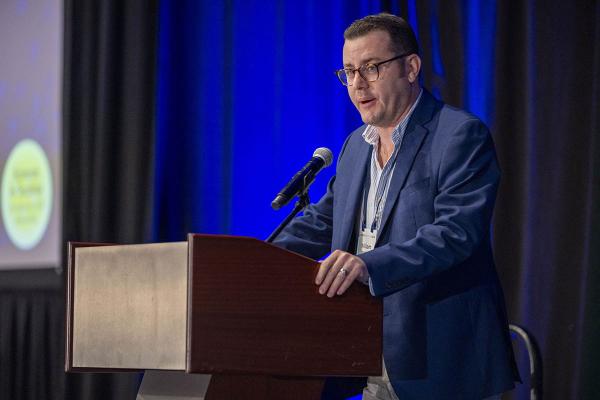
NASW honoree W.J. Hennigan delivering an acceptance speech during the ScienceWriters2024 awards ceremony. (Megan Mendenhall for CASW/NASW)
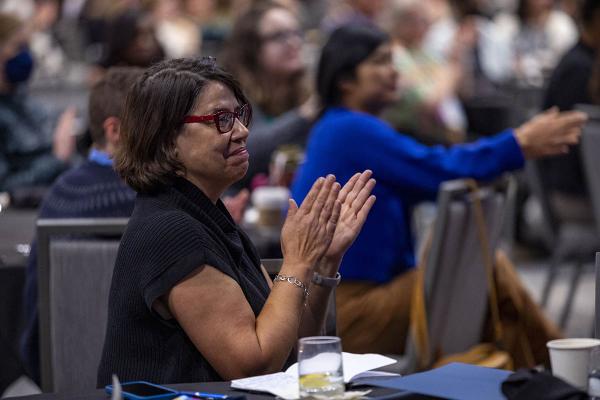
NASW member Usha Lee McFarling applauding fellow honorees during the SciWriAwards festivities. (Megan Mendenhall for CASW/NASW)
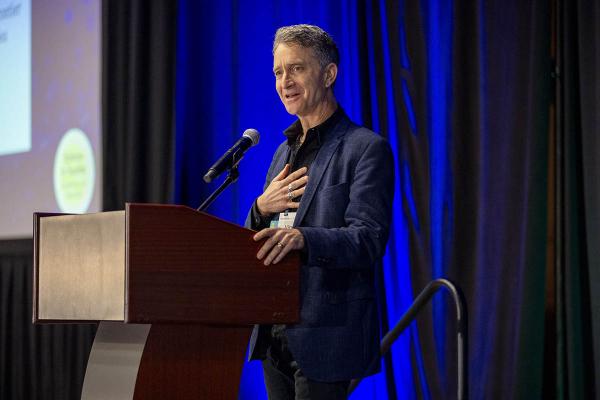
NASW honoree Vince Beiser delivering an acceptance speech during the ScienceWriters2024 awards ceremony. (Megan Mendenhall for CASW/NASW)
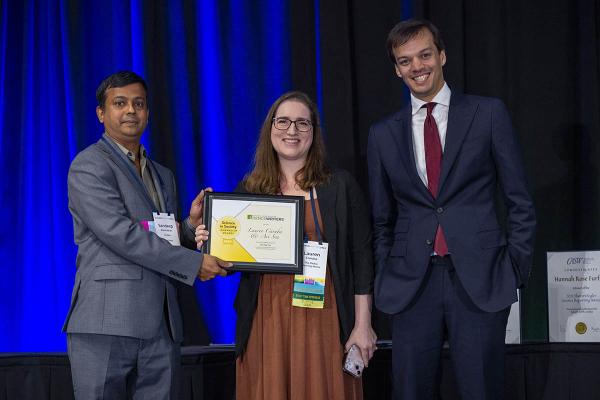
NASW honorees Lauren Caruba and Ari Sen accepting their award from Sandeep Ravindran. (Megan Mendenhall for CASW/NASW)
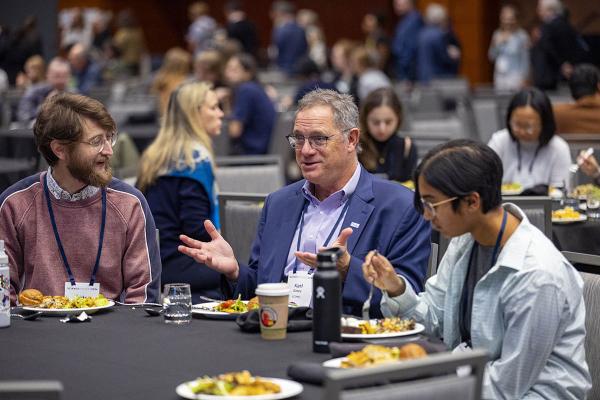
SCONC volunteers share a moment during the ScienceWriters2024 awards ceremony. (Megan Mendenhall for CASW/NASW)
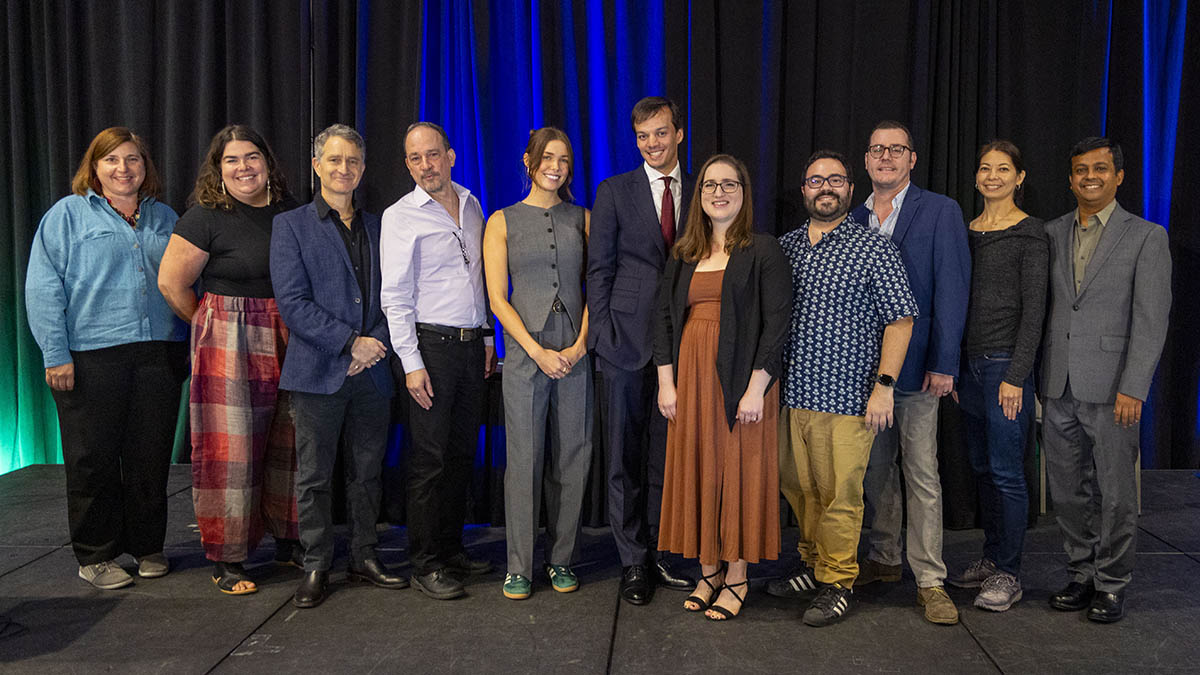
NASW honorees and volunteers pose after the ScienceWriters2024 awards ceremony. L-R: NASW Awards Committee coordinator Kate Travis; award winner Elizabeth Endicott; award winners Vince Beiser, Christopher Pollon, Marilyn Perkins, Ari Sen, Lauren Caruba, Rodrigo Pérez Ortega, W.J. Hennigan; NASW Awards Committee co-chair Jill Sakai; NASW board president Sandeep Ravindran. (Megan Mendenhall for CASW/NASW)
Nina Elkadi (@ninaelkadi.com) is a writer from Iowa who reports on the intersection of agriculture, water, and the environment. She is the incoming investigative reporter at Sentient.
This ScienceWriters2024 conference coverage article was produced as part of the NASW Conference Support Grant awarded to Elkadi to attend the ScienceWriters2024 national conference. Find more 2024 conference coverage at www.nasw.org
A co-production of the National Association of Science Writers (NASW), the Council for the Advancement of Science Writing (CASW), and the Science Communicators of North Carolina (SCONC), the ScienceWriters2024 national conference featured an online portion Oct. 16-18, followed by an in-person portion held in Raleigh, N.C., Nov. 8-11. Follow the conversation via #SciWri24 on Bluesky and on LinkedIn.
Founded in 1934 with a mission to fight for the free flow of science news, NASW is an organization of ~2,400 professional journalists, authors, editors, producers, public information officers, students and people who write and produce material intended to inform the public about science, health, engineering, and technology. To learn more, visit www.nasw.org and follow NASW on LinkedIn and Bluesky. And join us in celebrating #NASW90th.
Credits: Reporting by Nina Elkadi; edited by Ben Young Landis. Professional photography provided by Megan Mendenhall.
